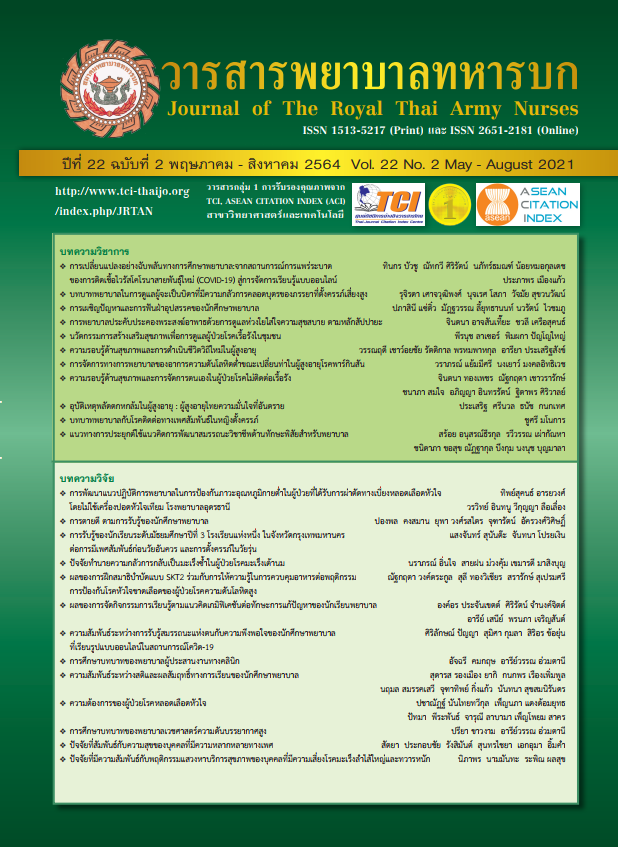The Effects of Neuro-Linguistic Programming on Inhibitory Controls to Lose Weight in Overweight Policemen
Keywords:
Inhibitory control, Neuro-Linguistic Programing: NLP, Overweight, PolicemenAbstract
The objective of this research was to develop and test the effectiveness of the inhibitory control for weight loss based on Neuro-linguistic programming training program (NLP-ICWL) in overweight policemen. The samples were policemen who had BMI more than 25 and they were divided by randomly matched pair of scores to be an experimental group and a control group, 10 policemen in each group. The research instruments were designed by the researcher: 1) the NLP-ICWL program with global unconscious reframing technique and 2) Go / No Go Task with Thai food and beverage images. The experimental group received the NLP-ICWL program for 2 sessions. The control group received only the knowledge from the balance calories, brain, mind and exercise personal book and self-training for 2 months. The assessments were done in pretest, posttest and 2 months follow-up phase. The data were analyzed by utilizing a repeated measures analysis of variance and paired-different test by Bonferroni method.
The findings were revealed that the experimental group that received the NLP-ICWL program had the mean score of inhibitory control for weight loss in the follow-up and posttest higher than pretest with statistical significance at .05 level. Additionally, the experimental group had the mean score of inhibitory control for weight loss higher than those in the control group and in the follow-up and posttest with statistical significance at .05 level. Moreover, the experimental group had the mean score of body composition in the posttest and follow-up period lower than the pretest and the control group.
Downloads
References
Arredondo GP. Body mass index in a group of security forces (policemen). Cross-sectional study. New Insights Obes Gene Beyond 2018;2:1-4.
Alghamdi AS, Yahya MA, Alshammari GM, Osman MA. Prevalence of overweight and obesity among police officers in Riyadh City and risk factors for cardiovascular disease. Lipids Health Dis 2017;16(1):79.
Houben K, Nederkoorn C, Jansen A. Eating on impulse: The relation between overweight and food-specific inhibitory control. Obesity 2014;22(5):6-8.
Tomiyama AJ. Weight stigma is stressful. A review of for the Cyclic Obesity/ Weight-Based Stigma model. Appetite 2014;82:8-15.
Shefer G, Marcus Y, Stern N. Is obesity a brain disease? Neuroscience & Biobehavioral Reviews 2013;37(10):2489-2503.
Bub KL, Robinson LE, Curtis DS. Longitudinal associations between self-regulation and health across childhood and adolescence. Health Psychology 2016;35(11):1235-1245.
Olds KC. Inhibitory Control Efficiency In Successful Weight Loss Participants. Graduate College Dissertations and Theses.
Diamond A. Executive functions. Annual review of psychology 2013;64:135-168.
Haenjohn J. Neuro-linguistic programming [NLP]: application for counseling, learning and Business: Chonburi, Get Good Creation; 2014;93-112(in Thai)
Sørensen LB, Greve T, Kreutzer M, Pedersen U, Nielsen CM, Toubro S, et al. Weight Maintenance Through Behaviour Modification: With a Cooking Course or Neurolinguistic Programming. Canadian Journal of Dietetic Practice and Research 2011;72(4):181-186.
Haenjohn J, Sirithadakunlaphat S, Supwirapakorn W. Development of Training Program on Promoting Executive Functions of The Brain in Adolescents. Journal of The Royal Thai Army Nurses. 2018;19(2):220-230. (in Thai)
Padyencheun W, Haenjohn J, Sirithadakunlaphat S. Development of Program to Promote Attention Based on Neuro-Linguistic Programming in Primary School Students. Journal of The Royal Thai Army Nurses. 2019;20(3):305-312. (in Thai)
Sailuenam P, Inung P. Haenjohn J. The effects of neuro linguistic programming on anxiety of freshmen students. Journal of the police nurses 2019;11(1):206-215. (in Thai)
Villar IVG. The unconscious mind; Our creative consultant: Philippins, Peimon Press; 1997; 58-63.
Bezdjian S, Baker LA, Lozano DI, Raine A. Assessing inattention and impulsivity in children during the Go/No Go task. British Journal of Developmental Psychology 2009;27(2): 365-383.
Appelhans BM. Neurobehavioral inhibition of reward-driven feeding: implications for dieting and obesity. Obesity 2009;17(4):640-647.
Downloads
Published
How to Cite
Issue
Section
License
บทความหรือข้อคิดเห็นใดใดที่ปรากฏในวารสารพยาบาลทหารบกเป็นวรรณกรรมของผู้เขียน ซึ่งบรรณาธิการหรือสมาคมพยาบาลทหารบก ไม่จำเป็นต้องเห็นด้วย
บทความที่ได้รับการตีพิมพ์เป็นลิขสิทธิ์ของวารสารพยาบาลทหารบก
The ideas and opinions expressed in the Journal of The Royal Thai Army Nurses are those of the authors and not necessarily those
of the editor or Royal Thai Army Nurses Association.






